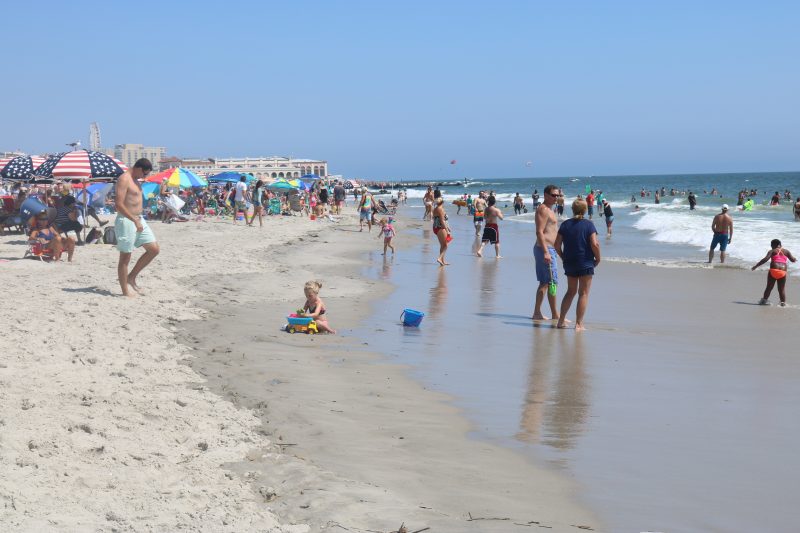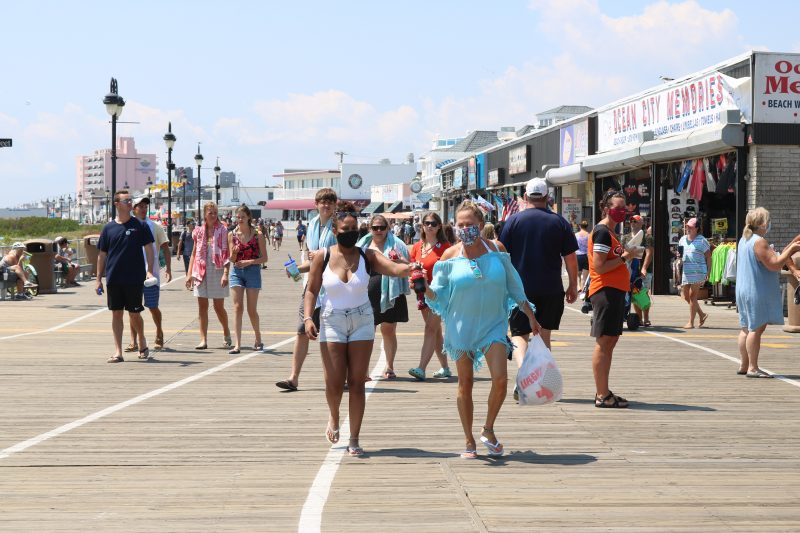By MADDY VITALE
Each summer, tourists and residents flock to Ocean City to bask on the sunny beaches, swim in the surf and stroll the Boardwalk.
But this year, amid the COVID-19 pandemic, the official kickoff to the summer season started a bit slower. Gov. Phil Murphy had lifted the coronavirus restrictions and reopened beaches for sunbathing, but some vacationers opted to wait and see.
Ocean City extended the discounted price for beach tags through June, from $25 for a seasonal tag to $20. The end of the discounted rate is typically the end of May.
When people decided to head to the beach, they bought up the daily and seasonal tags. June ended up being a banner month for tag sales, Ocean City’s Chief Financial Officer Frank Donato said back in July.
On Wednesday, Donato said despite the pandemic, the unofficial season-ending total for beach tag sales was $3.83 million for 2020. This compares to $4.03 million in 2019, a banner summer and one of the best since 2016, partly because of near-perfect weather.
“Although we were down about $200k this year compared to 2019, we were pleasantly surprised with the results given the impacts that COVID has had on peoples’ travel plans this year and the late start that our sales got off to given the uncertainty of the opening of the beaches and Boardwalk as we entered the early part of the summer,” Donato said.

The beaches continued to be a major attraction for the summer crowds.
By mid-May when Murphy officially lifted restrictions to allow sunbathing on the state’s beaches, people were flocking to Ocean City, Donato said.
“Once it was announced that beaches would be open and operating normally for the most part, we saw crowds representative of a normal summer,” he explained. “Going to the beach was the perfect outdoor outlet for those who were looking to enjoy some fresh air.”
Beach tag revenue covers the cost of keeping the beaches clean, employing lifeguards, hiring summer police officers, and paying for the city’s share of beach replenishment projects in partnership with the U.S. Army Corps of Engineers.
In all, Ocean City normally reaps about $4 million in beach tax revenue each year.
Ocean City annually leads all New Jersey shore towns in beach tag sales because of its sheer size. The city’s 7-mile-long beachfront is much bigger than neighboring towns, allowing it to handle enormous crowds.
Throughout this summer, city officials remained vigilant in their message urging visitors to adhere to the governor’s executive orders and follow safety protocols to lessen the spread of the coronavirus, including maintaining six feet of separation between strangers, wearing face coverings and using hand sanitizer.
Signs posted along the Boardwalk and at beach ends reminded people to follow the safety guidelines. Messages were played over the loudspeaker on the Boardwalk about the importance of social distancing. Hand sanitizing stations were installed in the city and on the Boardwalk.
The city gave out face masks to anyone who needed them at the welcome centers in town and at the Music Pier.

The Boardwalk buzzes on a busy August afternoon with people either wearing face masks or social distancing.
 The beaches continued to be a major attraction for the summer crowds.
By mid-May when Murphy officially lifted restrictions to allow sunbathing on the state’s beaches, people were flocking to Ocean City, Donato said.
“Once it was announced that beaches would be open and operating normally for the most part, we saw crowds representative of a normal summer,” he explained. “Going to the beach was the perfect outdoor outlet for those who were looking to enjoy some fresh air.”
Beach tag revenue covers the cost of keeping the beaches clean, employing lifeguards, hiring summer police officers, and paying for the city’s share of beach replenishment projects in partnership with the U.S. Army Corps of Engineers.
In all, Ocean City normally reaps about $4 million in beach tax revenue each year.
Ocean City annually leads all New Jersey shore towns in beach tag sales because of its sheer size. The city’s 7-mile-long beachfront is much bigger than neighboring towns, allowing it to handle enormous crowds.
Throughout this summer, city officials remained vigilant in their message urging visitors to adhere to the governor’s executive orders and follow safety protocols to lessen the spread of the coronavirus, including maintaining six feet of separation between strangers, wearing face coverings and using hand sanitizer.
Signs posted along the Boardwalk and at beach ends reminded people to follow the safety guidelines. Messages were played over the loudspeaker on the Boardwalk about the importance of social distancing. Hand sanitizing stations were installed in the city and on the Boardwalk.
The city gave out face masks to anyone who needed them at the welcome centers in town and at the Music Pier.
The beaches continued to be a major attraction for the summer crowds.
By mid-May when Murphy officially lifted restrictions to allow sunbathing on the state’s beaches, people were flocking to Ocean City, Donato said.
“Once it was announced that beaches would be open and operating normally for the most part, we saw crowds representative of a normal summer,” he explained. “Going to the beach was the perfect outdoor outlet for those who were looking to enjoy some fresh air.”
Beach tag revenue covers the cost of keeping the beaches clean, employing lifeguards, hiring summer police officers, and paying for the city’s share of beach replenishment projects in partnership with the U.S. Army Corps of Engineers.
In all, Ocean City normally reaps about $4 million in beach tax revenue each year.
Ocean City annually leads all New Jersey shore towns in beach tag sales because of its sheer size. The city’s 7-mile-long beachfront is much bigger than neighboring towns, allowing it to handle enormous crowds.
Throughout this summer, city officials remained vigilant in their message urging visitors to adhere to the governor’s executive orders and follow safety protocols to lessen the spread of the coronavirus, including maintaining six feet of separation between strangers, wearing face coverings and using hand sanitizer.
Signs posted along the Boardwalk and at beach ends reminded people to follow the safety guidelines. Messages were played over the loudspeaker on the Boardwalk about the importance of social distancing. Hand sanitizing stations were installed in the city and on the Boardwalk.
The city gave out face masks to anyone who needed them at the welcome centers in town and at the Music Pier.
 The Boardwalk buzzes on a busy August afternoon with people either wearing face masks or social distancing.
The Boardwalk buzzes on a busy August afternoon with people either wearing face masks or social distancing.